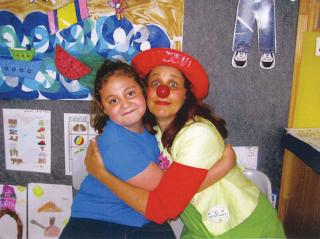A cancer recurred in a despondent patient. During her regimen of chemotherapy, the patient grew contemptuous towards medical staff.
The doctor turned to one of his greatest resources — a medical clown.
“So I went to her,” said Shoshi Ofir, an Israeli medical clown of the Dream Doctor group who calls herself Dr. Harta, a name denoting Dr. Nonsense. “The clown is the last person on earth she’d like to see, the complete opposite of what she feels.”
The patient spoke on a cell phone while undergoing treatment, and with a straight face Ofir interrupted her, “It’s dangerous to talk with your cell phone. It’ll give you cancer!”
“The patient looked at me in total shock, a woman who couldn’t even utter the word cancer.” Then the patient burst out laughing and retorted, “Thank you so much! Cancer is the last thing I need now!”
One might think a hospital is a serious place, where clowns don’t fit in and might be disruptive.
To the contrary, said Ofir, “When a patient enters a procedure feeling good, it works better and takes less time because of patient compliance, and patients seem to recover faster.”
At first, hospital administrators in Israel limited clowning to a few hours per week. Now, clowning is daily, and administrators entreat for the most hours possible, Ofir said.
And it is garnering attention throughout the world. Although Israelis did not invent medical clowning, Israel is at the forefront of the profession.
The world’s first medical clowning conference was held near Jerusalem, and Haifa University is the only institution in the world that offers a degree in the discipline.
Israelis hope medical clowning will benefit patients worldwide. “We aim to bring our clowning to make the universe better, and we want to share our love and art with whoever is willing to accept it,” said Ofir.
Ofir and two other medical clowns — Hagar Hofesh and Hamutal Ende — plus physician Hertzel Gabriel and social work researcher Dafna Tener, Ph.D., will be bringing that message to Wisconsin from Nov. 16-23.
The group will give workshops and presentations in venues in Milwaukee and Madison to staffs at universities and medical institutions, as well as to nursing and acting students.
In Milwaukee, a free community event featuring the delegation is scheduled for Tuesday, Nov. 18, 6:30 p.m., at the Harry & Rose Samson Family Jewish Community Center.
The delegation will be spending Wednesday, Nov. 19 in Madison, first at the University of Wisconsin-Madison School of Medicine and Public Health, and then Temple Beth El for a community dinner beginning at 5 p.m.
Particular need
This group comes from Sovev Kinneret (Around Lake Kinneret), the region of Israel paired with Milwaukee and Madison — and Tulsa, Okla., and St. Paul, Minn. — through Partnership2Gether.
P2G is the project of the Jewish Agency for Israel and Jewish federations. It links regions of Israel with specific Jewish communities with the goal of building personal connections between them.
P2G offers 450 programs a year and, in conjunction with the Milwaukee and Madison federations, is responsible for bringing the medical clowns to Wisconsin.
Said Elsie Crawford, the P2G coordinator for the Milwaukee Jewish Federation, “With all the negativity in national news on Israel, we felt bringing Dream Doctors would highlight a different side of Israel.”
Pnina Goldfarb, P2G chairperson for Milwaukee, added, “These programs build lifelong connections to foster understanding and love of Israel and Klal Yisrael (the whole Jewish people).”
There is a particular need in Israel for medical clowns, said Ofir. It has a population that finds itself under the threat of missiles, and is a place where post-traumatic stress disorder occurs in both citizens and military personnel.
“Here’s a big solider with a clown,” said Ofir. “The soldier thinks, ‘What is going on here? I’m a strong soldier, and there’s a clown here!’ Yet by doing that, you already break the line of anxiety.”
“Sometimes people are very anxious because they feel they have no control about what’s happening in the war, and any minute a missile can fall on us,” Ofir continued. “And so we decide when the missile is going to fall.
“All of us in the room count backwards, 10, 9, 8, and when we get to zero, we make a big noise, and we decide what we do when the missile falls. Maybe we all start dancing and singing. And then we are in control. We play the game, and we are safe here and we are taken care of.”
Although a clown might cover herself with a big red nose, issues are never covered-up. “We talk about everything,” said Ofir. “We talk directly. We are not afraid to talk about the issue, but we’ll talk through it in a clown’s way.”
Medical clowning has found its way into many medical fields in Israel, including in vetro fertilization and terminal diseases. In some procedures, clowns are present every step of the way, even during surgeries.
Ofir spends much of her time supporting sexually abused children. She said, “Children enter looking like ghosts, empty. Two or three hours later, they leave laughing and back to life.”
Medical clowns offer life, hope and, above all, love. “We are here at the service of medicine,” said Ofir. “And we’re willing to bring our art and our love to help sick and suffering people, and to help the medical staff through their difficult day.
“A doctor once told me, ‘You actually keep my sanity. Without you here, I would not be able to work in this job.’ So the tool is clowning. It’s bubbly. It’s funny. It’s easy going, but the work is serious.”
For more information about the Milwaukee events and to RSVP by Nov. 5, visit MilwaukeeJewish.org/MedicalClowns or call 414-390-5724. For more about the Madison events, visit JewishMadison.org or call 608-278-1808.
Joshua Becker is a Spanish teacher for Shorewood Public Schools and a freelance writer.



